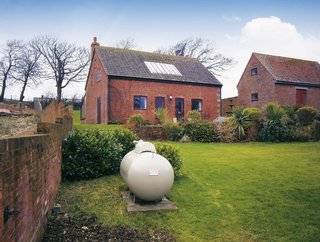Calor: LPG marketing cooks on CRM gas

The UK’s top supplier of LPG, Calor Gas is very much a hands-on company that sources, shifts and delivers.
Every day the company provides heating, cooking and energy solutions to homes across the UK and also supplies heating, catering, agriculture and transport sectors with cylinders and bulk tanks. Its parent company, SHV Energy, is an even bigger mover and shifter, turning over more than €5 billion in 27 countries with 13,500 staff.
But even such a physical operation can feel the rigour and strain caused by pace of technological change. Enter Simon Went, Head of IT for Calor Gas.
“The pace of change is now relentless, and this is being felt across businesses in all sectors not just Calor,” he comments. “There are a number of internal and external factors becoming more complicated, and in the role I play I would say that relationship management is an increasingly vital component.”
The need for sophisticated customer relationship management becomes all the more pressing when you consider the length and breadth of UK geography which Calor covers.
“We are a very traditional, physical, arguably simple business but also a very disparately located one. We have deployed mobile technology in the field for many years, however I see us using yet more of such technology enabling Calor to be a real time business,” Went explains.
“The days when we controlled all things related to IT are long gone. IT is not the sole preserve of the IT department anymore, everyone is into it and it is important that our internal stakeholders see us as a part of their conversations. Therefore, to meet the demands of the business we need the ability and agility to scale up quickly, and to do that we have developed a network of trusted partners.”
Smart marketing
Rules introduced by Competition Commission provide the backdrop to Calor’s customer retention technology drive. In a bid to remove barriers to switching providers in the LPG sector, gas tanks are now sold to the new provider in the event of a switch, removing the need to take away and re-install. Another key detail is that contracts can last no longer than two years, with companies like Calor having to inform customers when this time is reaching an end, notifying them that they are able to switch.
“We have around 50 percent market ownership on domestic bulk LPG tanks, so we had a lot to lose, meaning customer retention is absolutely critical to our success,” Went explains.
“Over the years we have generally managed the relationship with our 100,000-strong customer base in the same way. We were contacting them in the same way more or less without any differentiation or targeting. Calor has a wide range of customers up and down the country and we were not really taking account of that.”
Calor recognised the need to identify and group segments of customers, and with the help of an external provider did just this two years ago. This involved analysing mountains of data from many sources and the development of algorithms to identify customer segments which feed into a newly-purposeful CRM. “This is where Talend comes in,” Went says.
Talend
With the goal of revamping ETL (Extract, Transform, Load) and data integration processes with Calor’s data warehouse, Gartner recommended the installation of Talend, with Datalytyx selected to implement the solution.
“Talend is an enabler for us,” says Went, “especially in terms of customer segmentation and information and data management. It has proven its worth in terms of being able to shift large data volumes between platforms from multiple sources, and in quick time.
“However, we are still learning ourselves about customer behaviour and relating this to the personas we have been able to identify. So when we send the wake up offer towards the end of the contract period we are seeing what responses we get, what works well and what doesn’t. We should soon be able to identify some sweet spots within customer segments. If we can understand the customers better and understand what is important to them over time, we can personalise our offers and become more successful in retaining them, which is ultimately what we’re trying to achieve.”
While Went confirms that some early indications have been made as to potential successful approaches to certain customer groups, other factors beyond Calor’s control are likely to impact a customer’s thought process.
“The environment is changing, as is the price stability that we’ve had over the past year or two,” he adds. “Coming up with the initial set of algorithms isn’t a one off, we have to keep adapting as conditions change and as customer behaviour changes.”
Alongside Talend, Calor is looking ahead to many other technological enhancements, including a new CRM system to help interact with customers in much more modern way, whether it be digital, automated or personal.
Renewal of existing technology such as mobile phones for deliver drivers and asset tracking software are other items on the agenda – all with the aim of joining up to make Calor a truly real-time business.






